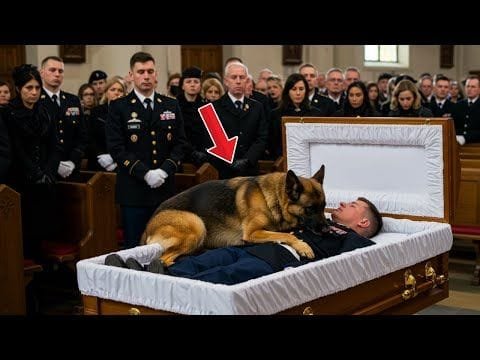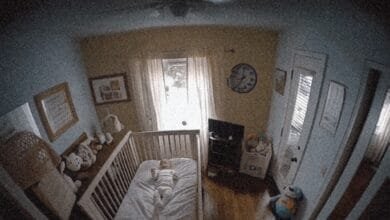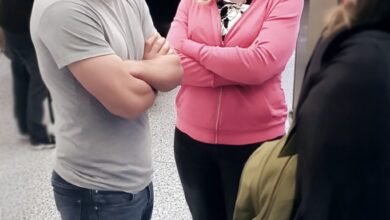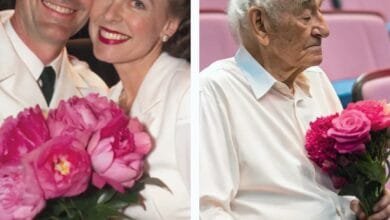Even at the Funeral, the K9 Refused to Leave His Side.

I didn’t expect to cry that much. Not in front of all those people. But when Rex — my uncle’s former K9 partner — leaped onto the casket, something inside me shattered.
Uncle Mateo was a battle-hardened veteran, tough as they come. After serving two deployments, he returned home with Rex, a jet-black German Shepherd who likely saved his life more than once. They became inseparable. Even after Mateo left the military, Rex continued working in search and rescue for another five years. We all knew Rex would take Mateo’s passing hard, due to a heart condition. But I wasn’t ready for what actually happened.

The ceremony was solemn and respectful. Military honors, the flag presentation — everything in place. I was standing beside my mother, gripping her hand so tightly I probably left nail marks. As the casket was wheeled into position, someone let Rex out of his crate. At first, he walked slowly, sniffing the air, as if trying to find Mateo.
Then he jumped. Right onto the casket. No barking, no growling — just a deep, heartbreaking whimper as he laid across the top, his head resting on the folded flag. The crowd went silent. Then came the sound: grown men crying. My cousin collapsing. Even the priest had to pause.
And then — God, I still don’t know why — Rex began pawing at the casket, like he wanted to get inside.
That’s when the funeral director rushed over to remove him.
But I stepped in between them.
“Don’t you dare,” I said.
Because what Rex did next changed that day — and in many ways, changed my life.
He looked at me with this raw, pure sorrow in his eyes, as if pleading for help to find Mateo. Despite the closed casket, Rex couldn’t accept that Mateo was gone. He nudged the polished wood and whimpered again, waiting for a response.
People around us shifted, uncomfortable.
“We need to continue,” the director whispered.
“There’s a schedule.”
But I couldn’t let them pull Rex away. Not after his loyalty. It would’ve felt like stealing a final moment from Mateo.
I raised my hand.
“Give him a moment,” I said.
“He deserves at least that.”
And they did. In that suspended silence, Rex remained with the casket while the honor guard bowed their heads. One of them had tears running down his face. The only sounds were the wind and Rex’s slow, aching breathing — the echoes of my uncle’s service.
After about a minute, Rex slowly climbed down, tail low. He hobbled toward me and rested his face on my knees. He still had a limp from a bullet wound he’d taken years ago. I knelt and placed a hand gently on his head. His ears perked up, like he remembered me from all those nights I spent at Uncle Mateo’s house.
The funeral resumed. I barely heard the final taps or salute. I was focused only on Rex’s heartbeat under my hand.
The reception afterward felt surreal. Everyone shared stories about Mateo — how he taught my cousin to ride a bike, how he always made people laugh, how he never gave up on anything. But I kept looking at Rex, sitting quietly off to the side. Mrs. Castillo, the neighbor, tried giving him leftover ham. He didn’t even sniff it. He was still searching for the man he had vowed to protect.
That’s when my mother walked up and placed a hand on my shoulder.
“You know he needs someone,” she said softly.
I understood what she meant. With Mateo gone, Rex needed a new home. I almost said, “Maybe Aunt Cecilia will take him,” but when I looked over, I saw her face — overwhelmed, lost in grief. She couldn’t bear it. No one else in the family had the time or the space for a retired K9 like Rex. And my cousin was only sixteen.
I realized then — I wanted to be that person. Mateo had been like a second father to me. Always showing up to my baseball games, always reminding me that falling down wasn’t failure — not getting back up was. And Rex? Rex was a part of him. A living legacy.
I nodded to my mother. She already knew.
Two days later, I brought Rex home. It wasn’t just a matter of opening the door. He had routines — strict ones. Advanced obedience drills. Early wake-ups. Long daily runs with Mateo. But now, he was grieving. He sniffed through my apartment looking for boots, uniforms, anything familiar. He slept beside Mateo’s old duffle bag, which I kept in my closet.
After a week, I got worried. Rex barely ate. He followed me around, but with his head down. His tail never wagged.
So I took him back to Mateo’s land — the old ranch outside of town. I got permission from Aunt Cecilia and signed some forms. She couldn’t go — too painful for her.
We arrived late in the afternoon. The setting sun cast a golden hue across the dusty yard. As soon as we pulled up, Rex’s ears perked. He stepped out of the car and headed straight for the old training field. Mateo had built a small obstacle course there — cones, ramps, even a makeshift wall.
Rex approached it slowly, sniffed the base of the wall, and turned to look at me.
Like he was asking:
“Are we doing this?”
I remembered watching Mateo train him. Instead of the usual “attack,” Mateo would say one word:
“Avanza.”
It means “advance” in Spanish. But from Mateo’s lips, it always meant: don’t stop. keep going. move forward.
I took a breath.
“Rex, avanza,” I said quietly.
And he did. He ran. Jumped the wall. Weaved through the cones. When he returned, his tail was wagging.
For nearly an hour, we trained — together. Just the basics. But his focus was back. His joy was back.
At sunset, we collapsed by the barn wall. Rex pressed his nose to my shoulder and sighed. It was the first peaceful moment we’d shared since the funeral.
I realized then — I needed that too. Losing Mateo had taken a part of me. But caring for Rex brought meaning back. My uncle’s legacy wasn’t just medals or folded flags. It was love. Loyalty. And the will to keep going.
Life found a new rhythm. Rex adjusted. He wasn’t the kind of dog to jump on the couch or wag at strangers, but he’d nudge me when I was down. He’d push me to run when I wanted to stay in. Some nights, I’d catch him at the window, watching over the street below — like he was still guarding something.
Months later, Lieutenant O’Dell, one of Mateo’s old friends, called me. A new K9 training center was being named in my uncle’s honor. They asked me to attend the dedication with Rex. I thought it would be a simple ceremony — a plaque, maybe.
It became a celebration.
Veterans, K9 handlers, even kids came. They told stories. They honored his courage. His kindness. His service.
When I spoke, my voice shook. I talked about how Mateo found Rex wounded overseas and turned him into a hero. As I rested my hand on Rex’s back, I realized we were still healing — together.
The ceremony ended in applause. A local reporter took photos of Rex in front of the new facility. He stood tall. He let the children pet him. He didn’t flinch.
On the way home, I kept thinking about that word:
Avanza.
Keep going. Don’t stop.
That night, I slept through for the first time in months. The next morning, Rex and I had breakfast together. Sunlight filled the kitchen.
For the first time in a long time, I felt hope.
Loss never fully fades. But love — the love Mateo had for Rex, and the love Rex still carries — stays.
And it gives us the strength to face the next day. To move forward.
So if you’ve lost someone, and you’re hurting, just remember: the bonds we keep can carry us through. We honor those who came before us by carrying their spirit forward — with kindness, with loyalty, and with the courage to avanza.
If this story moved you, share it. Click “like.” Someone out there might need this reminder today.





